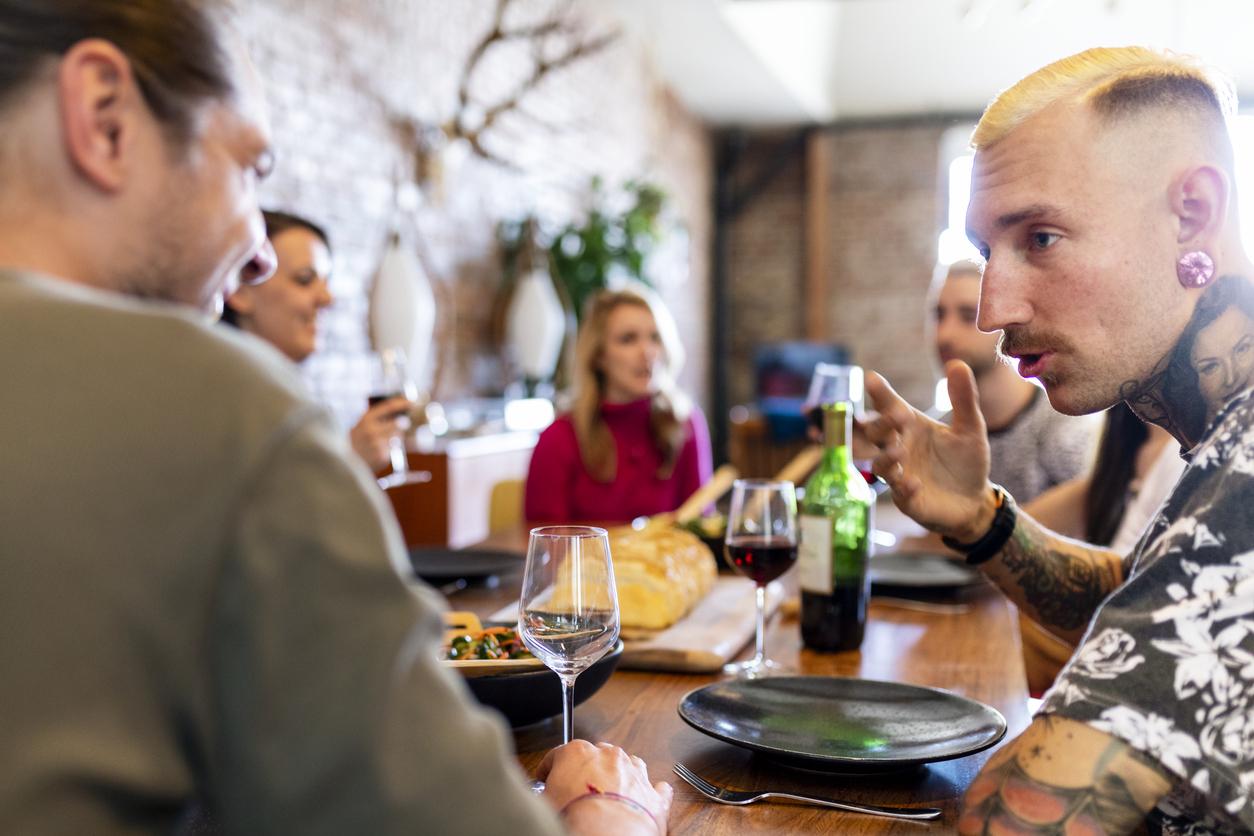Because it unleashes passions and reveals ideological fractures, politics is a subject of discord within the inner circle. On the eve of the legislative elections, how can we debate things that upset people without damaging our relationships?

- With the legislative elections of June 30 and July 7 approaching, how can we debate things that upset people, such as politics, with family or friends without getting into arguments?
- Political values ”are part of our identity, our personality, our intimacy: when we participate in a conflict of opinions, particularly political ones, we are in reality talking about ourselves. And our values are sometimes irreconcilable with the values held by others”, explains Dominique Picard, psychosociologist and author of Conflits relationnels.
- To avoid a fight, the specialist advises accepting the ambivalence of one’s opinions, adopting non-violent communication to talk about them, or even using meta-communication, that is, taking a step back and talking about what one is really talking about (for example, old family grudges).
A family dinner that ends with plates on the floor, a friendly debate that turns into a dialogue of the deaf, an evening that degenerates because of a partisan remark… Among family, friends, or even colleagues, political discussions tend to quickly turn sour. According to a OpinionWay studymore than half of French people (54%) admit to arguing with those around them about current affairs, particularly politics. For one in two people (49%), this is even the subject that most divides members of a family, ahead of inheritance (42%) and religion (32%), according to a Viavoice surveyAnd today, at a time of a rapid legislative campaign pitting three major camps against each other, there is reason to worry about the dishes.
To find solutions to these debates that poison meals, we must first understand why we argue so much with our loved ones about political issues. “It is precisely because two particularly sensitive subjects meet: politics and family, explains Dominique Picard, psychosociologist and author of Relationship conflicts (ed. PUF, 2012). Political differences are differences of opinion. But what we think is a simple opinion (for example being populist/globalist, or liberal/conservative) also and above all covers an ideology, a vision of the world, a system of values. But these values are part of our identity, our personality, our intimate: when we participate in a conflict of opinions, especially political ones, we are in reality talking about ourselves. And our values are sometimes irreconcilable with the values held by others.”
Politics and family, an explosive combo
Unsurprisingly, the political topics that spark the most sparks are therefore those that polarize people’s belief systems the most. Such as issues of racism, patriarchy, police repression, wealth distribution, sexual violence cases, the Israeli-Palestinian conflict, societal reforms, migratory flows… In short, divisive themes that push everyone to position themselves “for” or “against” according to their own values, and therefore on which it is difficult to find compromises and hold a constructive debate. This is nothing new, recalls Dominique Picard. “Even the Dreyfus affair [un capitaine de l’armée française, juif, accusé de trahison et finalement innocenté début XXe siècle] divided on values: on one side there were the pro-Dreyfus, attached to the values of justice and law, rationality and proof (and some of whom even declared themselves anti-Semitic), and on the other the anti-Dreyfus who defended the values of the army.”
Although the divisions have changed somewhat since then, politics (in the broad sense) still stirs up tempers. “It catalyzes all the problems that may exist in society, and the current context (legislative elections, war in Gaza, breakthrough of the extreme right…) can only reinforce authoritarian or extremist positions.” And even more so the arguments. But why does it explode to this extent between members of a family or between friends, even though they are close to each other? “It is difficult to talk with someone who is close to us and at the same time from the opposing camp, because every discussion is loaded with a history between the interlocutors, a history with anecdotes, adventures, affects, explains the psychosociologist. But families actually have a history that is particularly charged with affects, whether positive or negative. Problematic subjects, such as political opinion or being anti-vaccine, will in some way reactivate these affects. Ultimately, politics is sometimes a pretext to unload family tensions that we don’t normally talk about.”
In family and among friends, because our interlocutors have grown up with us, any debate would be more intense, more sensitive, and therefore more likely to degenerate into a fight between the pear and the cheese. But there are nevertheless some solutions to debate without jeopardizing our relationships.
Political debates: assuming, accepting and meta-communicating
Avoiding conflict when it is political is the first strategy chosen by the French: 51% of them change the subject of conversation and 37% continue the discussion but without going so far as to get angry, according to theCevipof survey “Love, family and politics”. Only 8% persist in defending their ideas at the risk of arguing and only 3% leave the table. “To calm the debate, the simplest thing is not to start it, Dominique Picard adds. If you have a habit of arguing with your sister, you can determine together, before a family dinner, the subjects to avoid at all costs, so as not to worsen your relations. When you know each other well, it is better to establish a minimum of prevention.”
Another amicable solution: accept one’s share of ambivalence. “All family and often friendly ties are crossed by myths (we love each other, we get along well, we will never leave each other…) where each person hides the ambivalences, the aspects of themselves that they think are negative. However, it is during events, such as elections, that these negative aspects of themselves are revealed and can divide. But if we are in an environment where ambivalence is more or less assumed and respected, then we are capable of overcoming conflicts.” In other words, don’t wait ten years before revealing to those around you that you have a penchant for extremist theories; the news will seem less brutal to them.
The tools of Nonviolent Communication (NVC) can also be relevant in cases of deep disagreements. “Instead of focusing on the other person’s attitude, that is, on one’s own desire to dominate the other, one must enter the debate: what do I hope to get out of this discussion, how do I feel about the other person’s behavior, what do I need, what can we do to find a solution together? And this involves speaking: listening to the other person until the end, not judging, not sulking, not getting up from the table, not insulting… If both of them respect this, it’s already a good start.” In this respect, the other guests around the table who are not participating in the discussion can also help the debaters to get out of the one-on-one, in order to avoid it getting bogged down in a competition of “who will dominate the other”.
Last but not least, use meta-communication, which means taking a step back and talking about what you are talking about. “During a heated discussion with your sister, for example, you can say, ‘Wait a second, what are we talking about here? Are we really talking about Macron and Zemmour, or are we still talking about our old grudges from our childhood?’ Or say, ‘Remember when we argued for hours about this the first time?’ If the two people are close, there is a good chance that this will immediately defuse the argument.” In short, a flash from the past to avoid the antics of the present. And the broken plates.
















